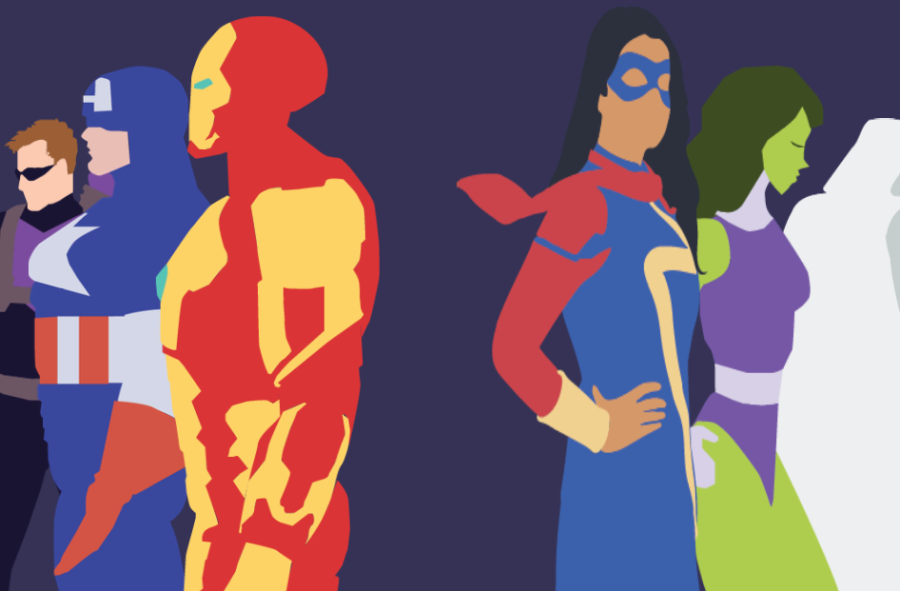Are Marvel’s new projects “bad,” or are you just not the target audience?
While the Infinity Saga featured aspirational characters such as Iron Man, Captain America and Hulk as well as countless groundbreaking moments, the lack of diversity and female representation was difficult to ignore.
January 13, 2023
Robert Downey Jr. Scarlett Johansson. Chris Evans. Their signatures scrawl from left to right as fans dry tear-filled eyes. The rolling of emotion-filled credits after “Avengers: Endgame” (2019) marked the end of an era for the Marvel Cinematic Universe. The epic finale drew to a close “The Infinity Saga” — Marvel’s first 23 films under their own studio banner, encapsulating three phases and dozens of shared character arcs.
After the retirement of at least a few of those beloved heroes, Phase 4 immediately began, taking on the challenging task of introducing a new generation of diverse characters. Now, three years later, Phase 4 is concluding with “Black Panther: Wakanda Forever,” which hit theaters on Nov. 11.
Marvel fans pick apart every project on social media, and Phase 4 has been no different. But, the material’s poor reception was new, with fans hailing down criticisms on nearly all aspects of the MCU’s latest installments. In one discussion board, the computer generated imagery is what was going downhill, and in others, the corny writing and jokes. For some, the recycled plotlines were too much. The most dominant criticism: Marvel has become too “woke.”
While the Infinity Saga featured aspirational characters such as Iron Man, Captain America and Hulk as well as countless groundbreaking moments, the lack of diversity and female representation was difficult to ignore. Marvel took notice, course correcting in Phase 4 — but not everyone agreed with this decision.
Instead of throwing all recent Marvel projects under the bus, fans should be more appreciative of the new lineup of heroes in this phase — characters who had all long existed in comic books prior to their recent appearances. Not only can fans of all demographics enjoy the unique characters and plotlines that Phase 4 brings to the table, but minorities can finally see themselves on the screen.
Out of the first 23 MCU movies, “Black Panther” was the only one to feature a non-white lead. In Phase 4, for the first time, the concept of racism enters as a central plot point — a complex topic that should have granted fans’ wishes, who often challenge Marvel to create rather than recycle.
On the Disney+ series “The Falcon and the Winter Soldier,” two of Captain America’s closest friends — Sam Wilson and James “Bucky” Barnes — navigate life after the death of Steve Rogers’ “Captain America.” Following the wishes of Rogers, Sam Wilson — known as “The Falcon” — takes on the mantle of Captain America.
Unfortunately, not everyone is supportive of a black man filling the role. Despite the hate the series received on social media about being too political, “The Falcon and the Winter Soldier” reflects the conflicts of the real world, including the ownership of American identity.
Marking a new era, the company finds itself catering to a larger audience of all ages and cultures. “Eternals” (2021) introduced fans to a diverse group of male and female superheroes from a variety of races and ethnicities with breathtaking, international cinematography to match. “Shang-Chi and the Legend of the Ten Rings” (2021) blends ancient Chinese culture with the modern world to create a visually stunning and action-packed film.
Sequel films like “Doctor Strange in the Multiverse of Madness” (2022), did bring familiar characters back to the big screen, but always while introducing new ones as well.
In “Multiverse,” the powerful teen America Chavez — a Latina superhero — made her debut.
Additionally, the series “Moon Knight” presents the first Jewish superhero in the MCU, and “Ms. Marvel” also adds to the diversity by featuring a teenage girl who juggles life in a Pakistani-American home with her newfound ancestral superpowers.
“Ms. Marvel” in particular does a beautiful job of portraying the culture of Pakistan, something that is rarely portrayed in large franchises.
“They’re not just throwing in a character and being like ‘Oh, by the way, she’s Pakistani,’” said Whitman teacher Joan Cline. “I learned a lot more about Partition and the history between India, and I was motivated to go read more about it.”
For years, male characters have dominated the MCU. The “big three” of the franchise — Iron Man, Captain America and Thor — all fit into the “strong male” archetype: proud, brave and masculine. While Phases 1-3 did feature female characters, they either received little character development like Jaimie Alexander’s Lady Sif, were sexualized like Scarlett Johnansson’s Black Widow or were mostly only love interests to the main hero, as Evangeline Lilly’s Wasp was to Ant-Man. This December, Johannson herself noted on a podcast that her character at first had been “underdeveloped and over-sexualized.”
The lone heroine who didn’t fall victim to this pattern was Captain Marvel, who received endless hate on social media for being “arrogant” and “cocky” — the same traits that fans love about Tony Stark.
Phase 4 has begun to end these tired stereotypes — in Captain Marvel and beyond — by skipping the sexualization and focusing on developing female characters into strong role models. The complexity of Wanda Maximoff’s character arc in the Disney+ series “Wandavision” sharply contrasted the poor development of other heroines in the MCU. As a series rather than a movie, the plotlines have time to focus on a second main, female character as well — Agatha Harkness.
Another dynamic character, Kate Bishop, emerged as a powerful and complex female lead in the series “Hawkeye.” Her witty personality and trying journey struck a chord with many female teens, including junior Anna Quinn.
“It was really refreshing to see a young girl who is still trying to figure out who she is as a superhero,” Quinn said. “Kate Bishop just seemed like a naturally powerful character who was strong, had her own different story and also happened to be a woman.”
Yelena Belova, the sister of Black Widow, and Kamala Khan, also known as Ms. Marvel, made their debut appearances in “Black Widow” and the Disney+ series “Ms. Marvel,” respectively. Similar to Kate Bishop, Yelena and Kamala are both exploring their place in the world — a struggle many teen fans can relate to.
As a teenage girl and MCU fan, seeing strong, skilled women with intricate personalities and complex storylines is both exciting and inspiring. While the writing may not be perfect, it’s nice to see women sharing the superhero spotlight nonetheless.
The final Phase 4 installment, “Black Panther: Wakanda Forever,” was a celebration of the African and ancient Mayan cultures as well as a tribute to the life of Chadwick Boseman — the late actor who played T’Challa in the first Black Panther movie. The film brings fans back to the glorious country of Wakanda amid the death of its king, whose legacy is carried on through the powerful women in his life.
T’Challa’s sister, Shuri, assumes the role of the Black Panther, and the Dora Milaje, a revered group of female warriors, shine by her side. Riri Williams, also known as Ironheart, was introduced to the MCU as well. This heartfelt and empowering film was packed with both female leadership and cultural diversity without taking away from the action or plot, closing out Phase 4 on a high note for many fans.
Some critics question why representation and diversity are important, arguing that Marvel Studios should produce superhero movies and shows, not films with political agendas. Fans across social media complained that Disney, who owns Marvel Studios, is trying to force representation and social ideologies into their projects at the expense of plot, character development and writing.
Marvel Studios had always catered to a small audience: white men. When you are a part of the already-represented demographic, it can be easy to forget that others are not receiving the same amount of representation. Women and people of color are not overtaking the MCU; Phase 4 films are just depicting a more accurate reflection of real-world demographics — finally.
As for Marvel becoming too “woke,” is the type of change implied by the term in Marvel’s case such a bad thing? Marvel’s earliest movies featured plenty of sexist and racist tropes. Tony Stark was best known for his unnecessarily misogynistic one-liners despite him being the head of the franchise and a widely-supported role model. His subplots too often resort to tired “damsel in distress” storylines.
While Phase 4’s approach to addressing these issues may have been explicit, these changes show the MCU is aware of the struggles people are concerned about. Even so, these flawed scenes are still ultimately rare over the course of Phase 4. Besides “The Falcon and The Winter Soldier” and “She-Hulk,” the majority of recent projects that included women and minorities did not blatantly address social issues such as sexism and racism. Marvel Studios is a popular company with an extraordinary influence over its viewers, so their attempts to advocate for social justice should be received with open minds, whether they’re brief or continuous.
As Phase 4 comes to a close, it’s difficult to deny that it has been a rocky terrain of highs and lows for MCU fans. However, hyper-focusing on the past rather than simply enjoying the newest installments overlooks the strides that Marvel has taken in building out its stories while employing more representation. Instead of scrutinizing Phase 4’s flaws, zoom out and take in the big, beautiful landscape that is the unfolding Multiverse Saga.
This story was published in print in December 2022.
All characters are registered trademarks of Marvel Studios.











Adam Mansfield • Sep 18, 2023 at 8:30 am
You brought up two heroes we had no problem with if you are a true marvel COMICS fan. Falcon becoming Captain America is canonical to the comics, so is Bucky becoming Cap. Most people of most races loved Black Panther, if not just the movie, but the character and actor himself RIP. But when you think having Shehulk twerk, practically manhandle a blind dude, and have your entire writers team admit that they did no actual research on courtroom proceedings prior to making the show. What were you planning? A Marvel law and order? Because THAT would have been WAY better than the garbage they fed us.
Drake Poe • Jan 20, 2023 at 11:50 am
horrible take
John Doe • Jan 20, 2023 at 11:43 am
skipping s–ualization? she-hulk was literally twerking with Megan thee stallion??? its clear this phase is wack
John Doe • Jan 20, 2023 at 11:39 am
skipping sexualization? she-hulk twerked with megan thee stallion its clear this phase is wack.